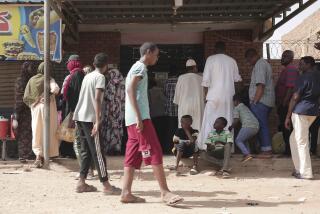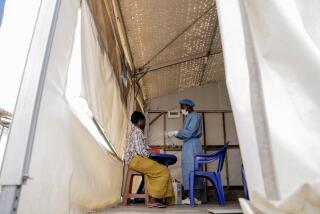Nigerian Polio Outbreak Spreads Over Region, Health Agency Says
JOHANNESBURG, South Africa — Fear and rumors in northern Nigeria about vaccinations have undermined an ambitious campaign to eradicate polio by the end of the year, international health officials said Tuesday.
The disease has swept from Nigeria into 10 other African countries that had been declared polio-free, threatening the largest outbreak seen in years, they said.
The epicenter of the polio outbreak is Kano state in northern Nigeria, a Muslim area that suspended polio vaccinations last year after religious leaders warned that they caused female infertility, officials from the World Health Organization said.
Dr. David Heymann, the organization’s representative on polio eradication, said rumors took hold that the vaccination was part of a plot to limit Muslim populations. Questioning the vaccine’s safety, parents were reluctant to vaccinate boys as well as girls, Heymann said Tuesday in a phone interview from Geneva.
He said Nigeria now accounted for 77% of all polio cases. “They have exported polio to 10 countries, going as far south as Botswana. It’s jumped to Chad and Darfur in Sudan. It’s continuing to hop around,” he said. From Nigeria, the disease is also believed to have been spread to Burkina Faso, Benin, Ivory Coast, Togo, Cameroon, Ghana and Central African Republic.
Officials confirmed Tuesday that a child in crisis-ridden Darfur, in western Sudan, had been paralyzed by polio, the first case in the country in three years.
The people of strife-torn Darfur, already facing starvation, are vulnerable to disease. About 1.2 million people have been driven from their villages by Arab militias, and humanitarian agencies predict mass starvation and disease in coming months.
The polio virus in the Darfur case was closely related to the virus found in Nigeria, United Nations health officials said.
The total number of polio cases so far this year is about 350, according to recent figures, which are about a month old. The cases include 256 children in Nigeria who have been paralyzed by the disease; 60 of those were reported in one week.
More recent figures showed that there were closer to 300 total polio cases in Nigeria, Heymann said. WHO officials fear that with the approaching rainy season, thousands more could contract the disease, because the virus is spread by poor hygiene and contaminated water.
The polio virus mainly affects children younger than 5, Heymann said. Most will be paralyzed for life. Few will be able to walk.
“All children under 5 need to be vaccinated, or we’ll see a major outbreak of polio throughout Central and Western Africa,” Heymann said.
The Global Polio Eradication Initiative, supported by the World Health Organization, UNICEF, Rotary International and the U.S. Centers for Disease Control and Prevention, has spent $3.1 billion since 1988 to try to eradicate polio before 2005. In 1988, polio was spread throughout 125 countries, affecting 350,000 people a year; now it is endemic in only six countries -- Nigeria, Niger, Pakistan, India, Afghanistan and Egypt. Ninety percent of cases are in Africa.
After the surge in polio cases, the initiative group has recommended an immunization program across 22 African countries in coming months, aimed at 74 million children and costing $100 million.
In many of the countries where polio has resurfaced, no more than 30% of children are vaccinated against the disease, Heymann said.
Tests by Nigerian health authorities several months ago proved the vaccinations to be safe.
Last month, the Kano governor, Ibrahim Shakarau, announced that vaccinations would resume, but to date children are still not being vaccinated. Heymann said he telephoned Shakarau on Tuesday, urging him to resume vaccinations.
More to Read
Sign up for Essential California
The most important California stories and recommendations in your inbox every morning.
You may occasionally receive promotional content from the Los Angeles Times.










